| Srl | Item |
| 1 |
ID:
175870
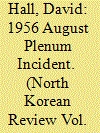

|
|
|
|
|
| Summary/Abstract |
Article Type: Commentary Essay Purpose— This article examines English language historiography surrounding the 1956 august Plenum Incident. It identifies the widely held "traditionalist" and recent "revisionist" views and compares them to assess if the incident really was a "factional" struggle. Approach— This paper identifies and analyzes key secondary sources from the 1950s to the 2010s alongside relevant primary sources to deconstruct and better understand historical understandings of this event. By doing this, this paper can assess if the event was a factional struggle. Findings— Through the analysis of various secondary sources on this event, this paper identifies and explores the dominant "traditionalist" view in scholarship, that this event was indeed a factional struggle. This paper also identifies the recent "revisionist" view, that the incident was a policy dispute over de–Stalinization rather than an attempt to depose Kim Il-sung as North Korea's leader. This article concludes on the side of traditionalism that it was most likely a factional struggle, although it acknowledges that wider access to primary sources will be needed to draw any definitive conclusions. Originality— A careful consideration of both "traditionalist" and "revisionist" arguments, along with relevant primary source material, brings together previous and contemporary understandings of the 1956 august Plenum Incident.
|
|
|
|
|
|
|
|
|
|
|
|
|
|
|
|
| 2 |
ID:
179019
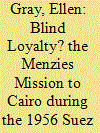

|
|
|
|
|
| Summary/Abstract |
This analysis questions the dominant view of the role played by Australian Prime Minister Robert Menzies in the early stages of the 1956 Suez Canal crisis. Tasked with the responsibility of discussing a peaceful settlement to the crisis with Egyptian President, Gamal Abdel Nasser, Menzies’ mission to Cairo failed. Previous accounts overwhelming consign the collapse to Menzies’ blind loyalty to the British Empire. However, the reasons for the negative outcome were more complex. Rather than merely acting out of devotion to Britain, Menzies also placed significant importance on United States policy, causing him to miscalculate the international political climate. Additionally, other factors like the divide between Menzies and Nasser’s ideological beliefs, Menzies’ legal background, and his wartime experiences shaped the outcome of the discussions. However, failure lays not solely with Menzies. The actions of other Powers also affected the proceedings; in particular, American and British hidden agendas and on-going Anglo-French military operations helped seal the fate of Menzies’ mission.
|
|
|
|
|
|
|
|
|
|
|
|
|
|
|
|
| 3 |
ID:
163316
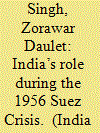

|
|
|
|
|
| Summary/Abstract |
The 1956 Suez conflict was not inevitable. The involvement of an impartial third party had offered an exit ramp for the main protagonists. Largely forgotten today, India strove to reconcile the interests of the Westerns powers with Arab nationalism. Displaying creativity and perseverance in attempting to arrest the sudden deterioration in security in its extended neighborhood, India’s unceasing but responsible support for a weaker Arab state in the backdrop of determined Western coercion is a useful illustration for contemporary policymakers who are attempting to craft a sustainable approach towards a tumultuous West Asia. Using previously unused archival documents, this paper adds to the small literature on India’s involvement in this crisis by offering the first detailed account of India’s attempt to prevent the outbreak of hostilities in those fateful months of 1956. By doing so, this article also reveals interesting facets of India’s approach to conflict management and regional stability in the 1950s, a role that was predicated on not just promoting strategic restraint between antagonistic states but also enabling conflict resolution options that preserved the vital interests of competing actors.
|
|
|
|
|
|
|
|
|
|
|
|
|
|
|
|
| 4 |
ID:
103989


|
|
|
|
|
| Publication |
2011.
|
| Summary/Abstract |
The lack of official government attention to Japanese war crimes during the Mao years has been widely acknowledged. Yet in the summer of 1956, years of preparatory work by Zhou Enlai culminated in the little-known and summarily dismissed trials of 1,062 self-confessed Japanese war criminals in Shenyang and Taiyuan. The extraordinarily lenient sentences given to 45 of the worst offenders - and wholesale pardons of 1,017 - were prompted by larger geopolitical considerations that effectively hamstrung PRC authorities from bringing the trials into closer alignment with previous ones in Europe and Japan. Zhou's determination to adopt a "policy of leniency" towards the Japanese prisoners, however, was sorely at odds with the sentiments of the general public. The need to prepare the people for a counterintuitive mass clemency saw a sudden and drastic shift in media discourse in 1954, followed by a series of remarkable cultural and intellectual campaigns that were designed to persuade the Chinese people that they should henceforth let bygones be bygones.
|
|
|
|
|
|
|
|
|
|
|
|
|
|
|
|
| 5 |
ID:
147091
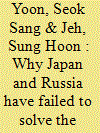

|
|
|
|
|
| Summary/Abstract |
Despite the several chances of agreement, Japan and Russia have failed to solve the dispute over the Northern Territories/South Kuril Islands. The 1956 model seems to be the most plausible method, but the lack of political coherence of the central politics and the will of negotiation became the factors that hinder the two countries from reaching an agreement. By reviewing the conflicting footprints and strategies of the two countries, the authors argue that the more democratized and diffused a political system is, the more difficult it is to come to an agreement in negotiations. This intensifies the existing theory of foreign policy decision-making process emphasizing the influence of domestic constituents.
|
|
|
|
|
|
|
|
|
|
|
|
|
|
|
|
| 6 |
ID:
145048
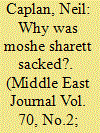

|
|
|
|
|
| Summary/Abstract |
Drawing mainly on the diary of Israeli politician Moshe Sharett, this article examines the circumstances surrounding his forced resignation as foreign minister in 1956. It was Prime Minister David Ben-Gurion who insisted on Sharett’s removal but refused to reveal his reasons publicly. This examination of why Sharett was sacked also offers wider insight into conflicts between activism and restraint within Israel’s political and military elite in the lead-up to the Sinai War.
|
|
|
|
|
|
|
|
|
|
|
|
|
|
|
|